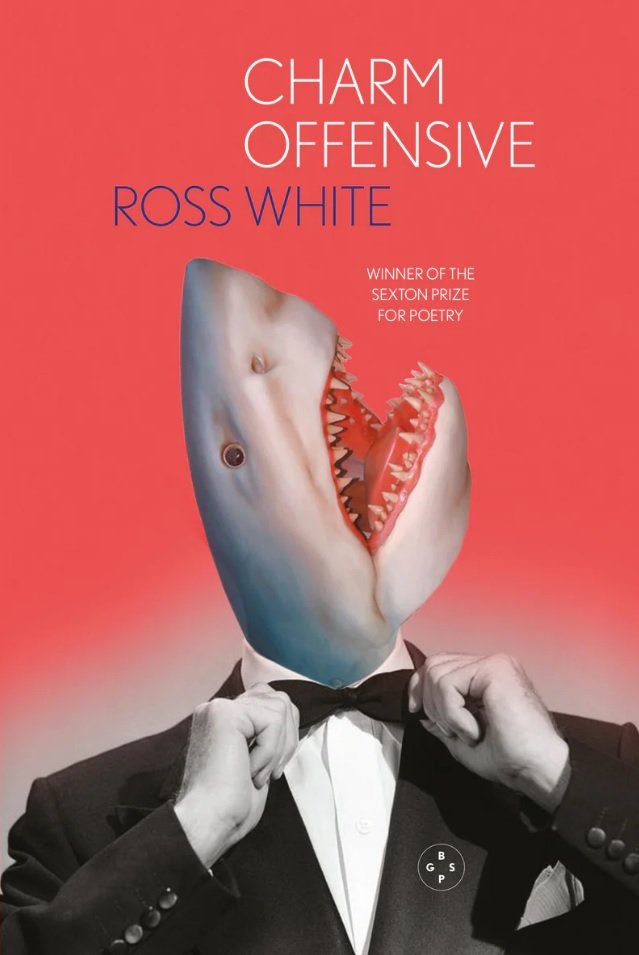Barrelhouse Reviews: Charm Offensive by Ross White
Reviewed by Alex Gurtis
Black Spring Press Group / July 2023 / 77 pp
If Ross White’s debut poetry collection was an art installation, it would be a mixed media experience with screens highlighting airplanes, running horses, and heartbeats. Many lines in the collection reference expressions of movement and propel the book’s four sections forward. “Expert Advice for Your Day at the Track” notes that “Time is aways fully automatic, / measured not in units but in the space / between finishes.” White’s mindfulness practice and grounding exercises produce a meditative text that extrapolates the moments between actions and reframes them with absurdist humor. The result assuages the anxiety of aging, a central theme of the text.
In “You Are Forever a Visitor In Your Own Home,” the speaker relates that “A psychic told me I would die at fifty-two/of heart trouble.” This encounter with mortality fuels the anxious language from which many of these poems arise. “Two Swans,” the linchpin of the collection, details the speaker’s experience getting a prophesied EKG. “The nurse says, You seem a little anxious and I am.” While, ultimately, the speaker learns they are fine, this encounter with death haunts the book, as the speaker comes face to face with their mortality. Fortunately, White’s absurdist humor offsets this solemnity in some of the best pieces in the book. From “Believer, Affix a Fish to Your SUV”:
I want Hot Rod Yahweh, Jr. to rev the engine
of my love for fellow motorists,
a love for fellow motorists,
a love I forget a little more with each on-ramp
every parking lot, any time someone
Putters along at 53 on an Interstate.
May he bless me, Turnpike Christ, as he raises
his hands to embrace the long handles of the chopper.
White’s use of the Dickinson’s slant truth, and his absurdist imagery, evokes Britton Shirley’s “Spinning the Vast Fantastic.” “Believer, Affix a Fish to Your SUV” works like a motorist’s prayer. Hot Rod Yahweh, Jr. humorously reframes familiar traffic and offers levity instead of frustration.
Narrative tensions surround the inevitability of aging, giving many pieces an anxious urgency. In “Heavenly Bodies” the speaker “realize(s) what astronomers knew. . .the skies are fixed bodies, the world is turning. It’s just faster this morning,” after seeing the “death” of a stuffed bunny. Death of youth and fear of mortality haunt a drive along the highway as the speaker faces a dilemma: “the world is spinning north to south. I am in my car doing sixty, east to west.” Realizing that you are driving, or perhaps living, toward an unattainable life fuels the collection’s philosophical musings. This representation of aging captures the speaker's struggle as they enter mid-life--the purgatory between youth and old age.
Despite a fraught relationship with God in poems like “I Know What Love Is,” the language of Catholicism and a force greater than the speaker appear throughout the collection. In “Quae Nocent Saepe Docent,” a Latin phrase that roughly translates into “pain is the great teacher,” the speaker discovers how “One can not know incompletion until completion. Newly in love/….it never occurred to me that I might undress my beloved and discover / the white blooms of scar across her back, shadows of the great teacher.” White’s work rejects Western religion and instead channels Buddhist teachings. This outlook creates a distance between life’s disorienting experiences with death and other pains and the speaker’s sense of self.
Throughout the text, the speaker dwells on accepting the liminal space of near-death experiences. In “Old Gods,” the speaker drives through a storm with no clarity in sight, but that is okay:
The past calls us love, love and
the future calls to us come, come.
The only moment unable to speak
Is now: rain between twin yellow lines,
Oil pooling on asphalt, the hazards
compiling and potential. Steady
hands on the wheel. Fog in the distance.
Past and future have voices. The present is action, the movement of “rain between twin yellow lines” filled with hazards. Emotionally, our speaker drives on, “Steady / hands on the wheel” despite the “Fog in the distance.” This radical act of acceptance completes an emotional arc while giving the reader a lesson in mindfulness.
Charm Offensive grips the reader. Its poems cope with the existentialism of assessing oneself after a brush with mortality. Meditating in the moments wherein a horse takes a lap at the track, a car gets stuck in traffic, and the speaker moves (in vehicles or not) through life, White grounds the reader in the present. He asks us to consider our own encounters with death by demonstrating how a heart condition can lead to dissatisfaction and a subsequent search for fulfillment.
“Charm offensive” means a campaign of flattery and friendliness designed to achieve the support or agreement of others, or, in this case of this collection, an attempt to stall the universe from delivering a premature death. While the poems convey gravitas, White’s absurdism ties the book together with images that urge the reader to crack a defiant smile.
Alex Gurtis is a poet and critic whose work has appeared or is forthcoming in Autofocus, HAD, Rejection Letters, The Shore, and others. A ruth weiss Foundation Maverick Poet Award Finalist, Alex received his MFA from the University of Central Florida and is the co-owner of the independent bookstore, Zeppelin Books.

